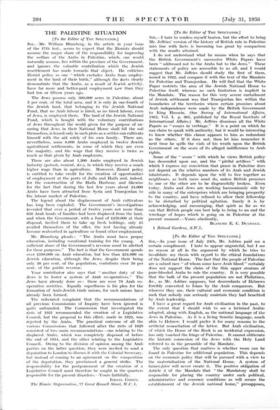[To the Editor of THE SPECTATOR.] SIR,—I hate to confess
myself beaten, but the effort to bring Mr. Jeffries' version of the history of British rule in Palestine into line with facts is becoming too great by comparison with the results attained.
I do not understand what he means when he says that the British Government's successive White Papers have been " addressed not to the Arabs but to the Jews." These statements of policy are accessible to us all, and I would suggest that Mr. Jeffries should study the first of them, issued in 1922, and compare it with the text of the Mandate for Palestine and Transjordan. He will find that the White Paper restricts the area of the Jewish National Home to Palestine itself, whereas no such limitation is implicit in the Mandate. The reason for this very severe curtailment of Jewish settlement was that Transjordan lies within the boundaries of the territories where certain promises about Arab independence were made by the British Government to King Hussein. (See Survey of International Affairs, 1925, Vol. I, p. 361, published by the Royal Institute of International Affairs.) Mr. Jeffries dismisses all the White Papers as " essays in verbiage." It is a point on which he can claim to speak with authority, but it would be interesting to know whether this clause appears to him as redundant as the others. If it does not, then let him remember it next time he spills the vials of his wrath upon the British Government on the score of its alleged indifference to Arab rights.
Some of the " scorn " with which he views British policy has descended upon me, and the " pitiful artifices " with which I express my conviction that peace in Palestine does not depend on the relative numbers of its Arab and Jewish inhabitants. It depends upon the will to live together as neighbours, as both races must do, unless British promises to one or the other are to be disgracefully broken. Even today, Arabs and Jews are working harmoniously side by side in many of the enterprises which are bringing prosperity to the country, and have refused to allow their fellowship to be disturbed by political agitation. Surely it is by acknowledging, and encouraging, that spirit as far as we can that British people can best help to bring to an end the wreckage of hopes which is going on in Palestine at the present moment. —Yours obediently,
BLANCHE E. C. DUGDALE.
1 Roland Gardens, S.W.7.






































 Previous page
Previous page